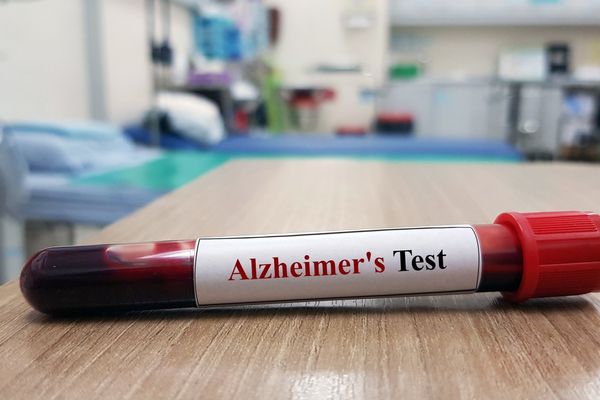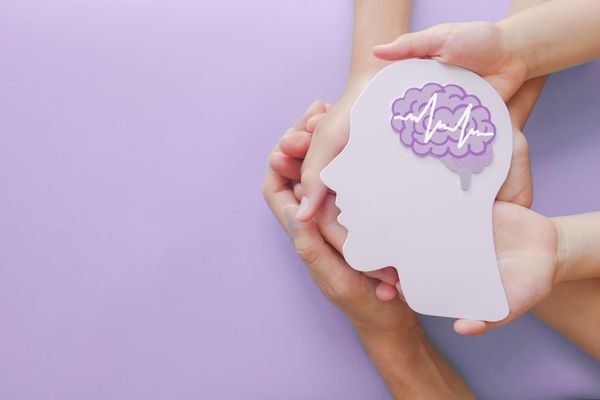You might have a habit of misplacing your cell phone. Or maybe there was the time you ran into an old high school pal—the one whose yearbook you signed, "friends 4-ever"—but you blanked on her name.
With June being Alzheimer's disease and brain awareness month, it's a good reminder to learn the early signs of Alzheimer's, a disease of the brain that causes gradual memory loss as well as a decline in thinking and reasoning skills.
So maybe you're wondering: If I forget things, misplace belongings, blank on a word or a name, am I destined for Alzheimer's?
Not necessarily. With life being busy and our minds constantly challenged with processing and storing new and old information, it's totally normal to occasionally slip up in the memory department.
Another culprit? Multitasking. Most of us inevitably find ourselves doing a zillion things at once, which is an impossible thing to do, according to recent research. Although we may think we are capable of it, multitasking is but a myth. Our brain is not designed to perform multiple tasks at the same time.
Memory is also a function of the cognitive decline that's a normal process of aging. Our memory or recall of events that happened years before are stored and preserved; yet, recent memory or the formation of new memories becomes more vulnerable as we age.
Alzheimer's is so much more than occasionally forgetting things. It's when forgetting begins to disrupt your day so that it becomes difficult to perform tasks and live the way you're accustomed to, and you may show other signs, too.
When Alzheimer's is detected early, you can seek treatments that can help relieve some symptoms and sometimes slow progression of symptoms, often enabling you to live more independently for longer. You may also be able to participate in a clinical trial and, in return, help contribute to medical advances and future treatments.
Learn How to Make Your Home Safer for Someone With Alzheimer's.
If you're worried that you might have early onset Alzheimer's, which affects about 200,000 Americans under age 65, read on.
- Memory Loss Don't worry if: You have the occasional lapse like forgetting an appointment (but remembering it later on). When it might be problematic: Forgetting things like information you just learned, important dates or events, asking someone to repeat the same information over and over again, becoming increasingly dependent on memory aids like lists or electronic devices, or becoming more and more dependent on family members to help you with things you used to do or manage on your own.
- Trouble planning or solving problems Don't worry if: You make occasional mistakes when balancing your checkbook. When it might be problematic: If a recipe you've cooked many times becomes difficult to follow, or you have trouble concentrating, keeping track of your monthly bills or experience trouble developing or following a plan.
- Trouble completing familiar chores at work, home or leisure Don't worry if: You need help from time to time with settings on your stove or television or other electronic devices. When it might be problematic: If you have trouble remembering how to drive to a familiar location or can't remember the rules of a game you play often.
- Becoming confused about where you are in time and space Don't worry if: You thought today was Monday, but it's actually Wednesday (but you eventually figure that out). When it might be problematic: If you forget where you are or how you got there or have trouble understanding something if it's not happening immediately.
- If visual cues and spatial relationships are difficult to grasp Don't worry if: You have vision changes due to physical changes like macular degeneration or cataracts. When it might be problematic: If you have trouble reading, seeing colors or contrast or judging distances (and as a result, you may have trouble with driving).
- If you have problems with words when you speak or write Don't worry if: You sometimes have trouble finding the word you want to use. When it might be problematic: You frequently pause to search for the right word; you can't remember the word you'd like to say; or you call things by the wrong name (such as, calling a watch a "hand clock"). Some people may gradually withdraw from social activities because of the difficulty or embarrassment in talking to others.
- Putting things in unusual places. Don't worry if: You put an item down, then need to retrace your footsteps to find it. When it might be problematic: If you cannot retrace your footsteps and retrieve a lost item or you place an item in an unusual place (like putting the ice cream in the oven). Sometimes people will accuse others of stealing when an item is lost or misplaced.
Alzheimer's is not only hard on the person it affects but can also place a lot of stress and sadness on their loved ones. It's not unusual for someone with the disease to become suspicious, depressed, anxious, fearful or easily upset and frustrated.
There are currently five medicines approved by the U.S. Food and Drug Administration to treat the cognitive symptoms of Alzheimer's. Although they cannot cure the disease or prevent it from progressing, they may help lessen or stabilize the symptoms. There are also nondrug treatments that may help with behavioral symptoms. It's important to seek a diagnosis early and get support if you are the caregiver.







